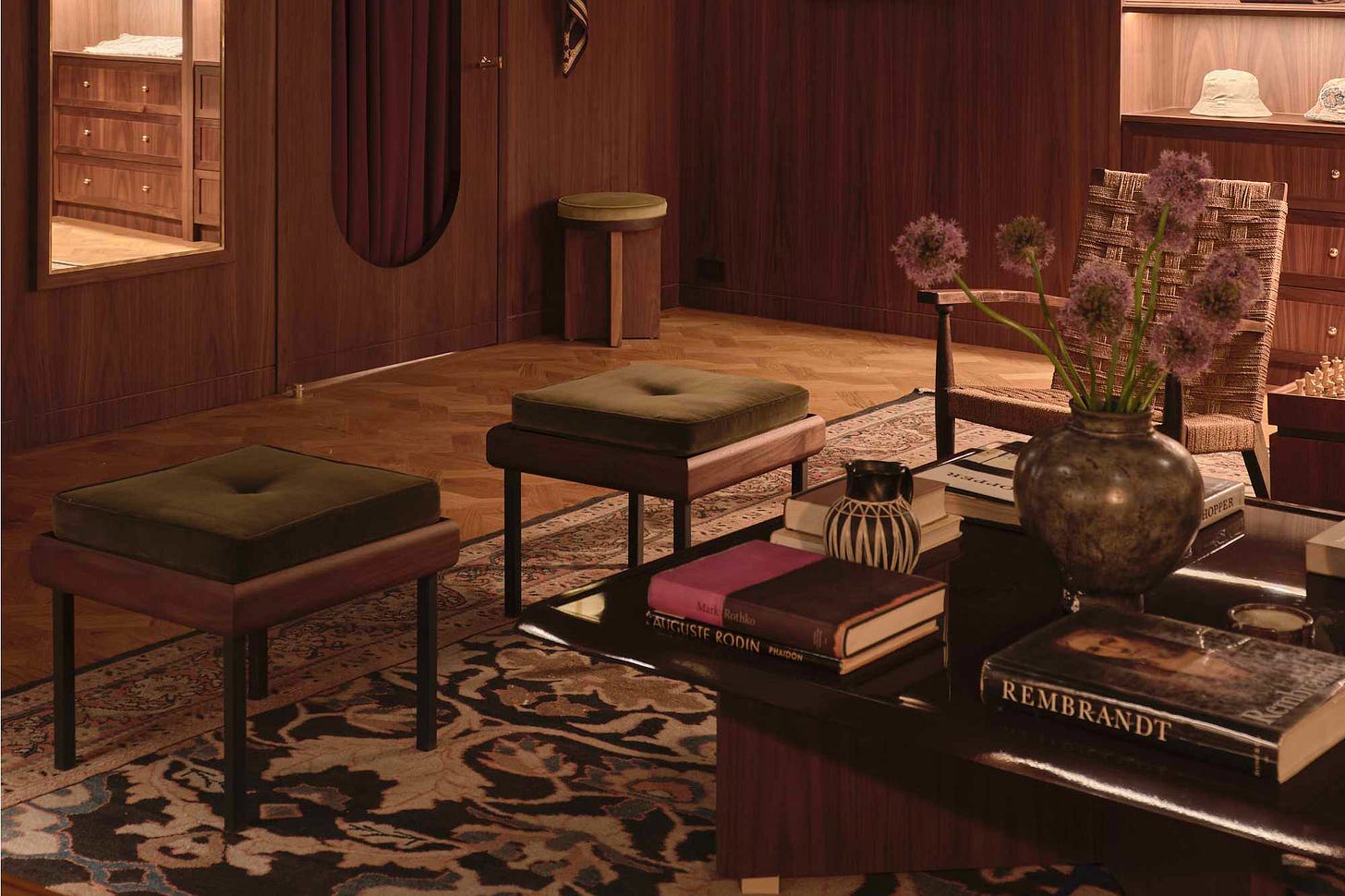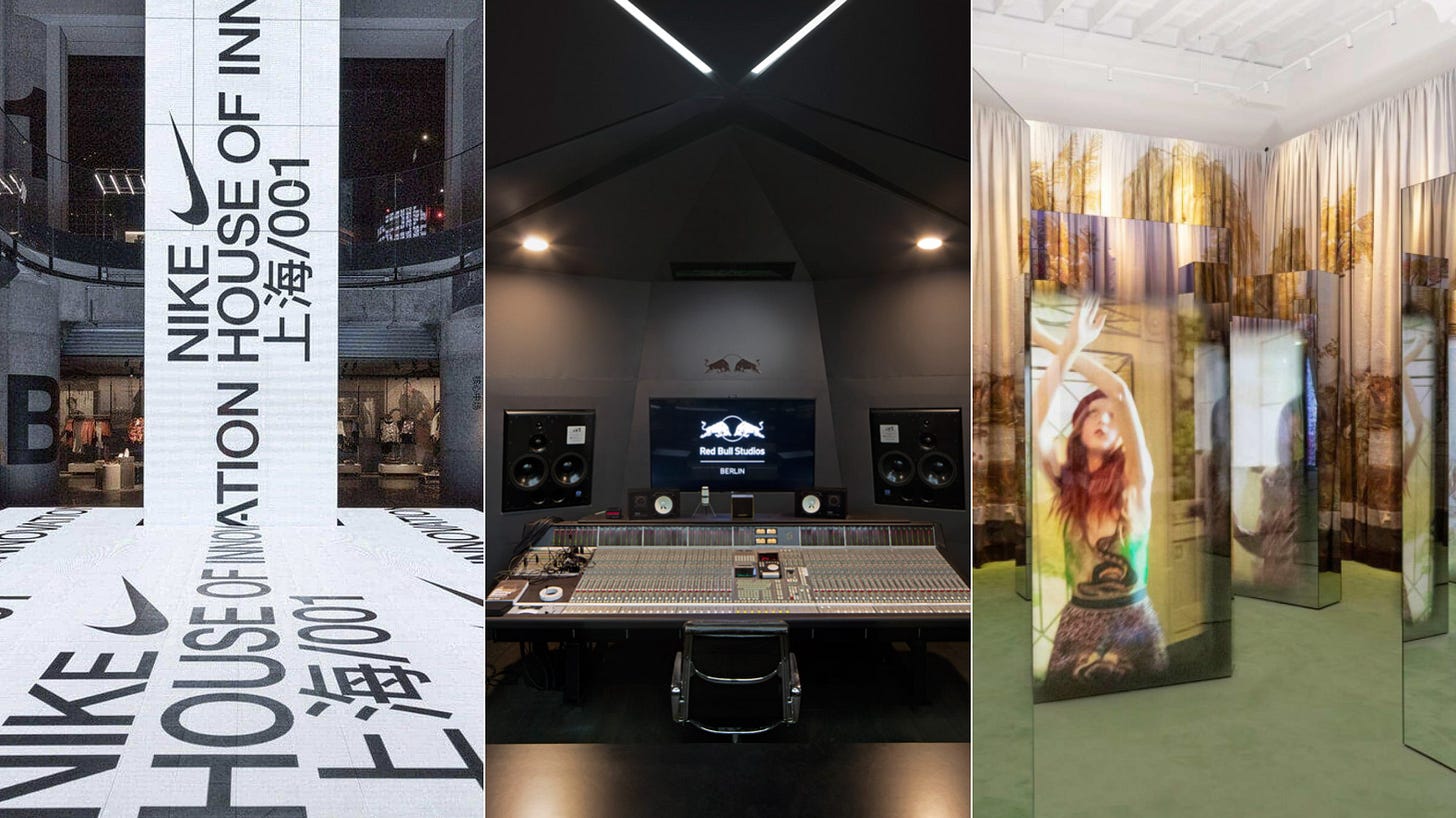📒 Long Read on Brand-Clubhouses
Neo-car showrooms, Italian palazzo's, and Unpurchaseable trinkets / ⏱ 6 minutes
A few months ago, I participated in a panel discussion for a project I'm working on at 'NIO House' in the city center of Rotterdam.
The day before that, I had taken my own car to an Audi dealership for service at a windy industrial estate. On my way back, on a loaned bike in the rain, I tried to find a silver lining in at least having avoided the typical car dealer's (paper) cup of coffee.
NIO House, located next to a high-end jeweler and a wine shop, is a space designed by MVRDV where you can book meeting rooms, work, attend or host talks, have breakfast, and enjoy a more than acceptable cup of coffee. And if you want to buy a 72K NIO ET7, they can help you with that too.
This first edition of my renewed and refreshed 'FIELD NOTES' newsletter zooms in on ‘Brand-Clubhouses’.
Defining 'Brand-Clubhouse'
NIO is one of many brands that are exploring the world of hospitality and incorporating elements from other service-based industries (such as co-working spaces) to reinvent key brand touchpoints. They are transforming traditional retail experiences into Brand-Clubhouses.
Brand-Clubhouses are spaces hosted by non-hospitality brands that focus on providing hospitality, and other lifestyle functions, to cater to their specific community. Let’s use this as the starting point and definition going forward.
An 'unpurchaseable trinket'
Aimé Leon Dore, the NYC fashion brand, has built a community that has grown into a global cult-following over the past few years. They offer experiences beyond traditional fashion retail. In addition to unexpected brand collaborations and projects, they opened a coffee spot at their previous flagship store on Mulberry Street in NYC. However, as people started spending their whole day there, it became too crowded for actual shoppers to visit the store.
To address this issue, the brand expanded the space last year. They opened a larger store, a separate cafe, and a secret clubhouse in between. This clubhouse, with no official name and not even officially open, was described by the New York Times as an 'unpurchaseable trinket'. It hosts surprise DJ sets and small gatherings, adding a desirable mystique to the store-as-clubhouse experience. It's an exclusive space that creates a sense of belonging for those in the know.
ALD's initiatives successfully merge exclusivity with a genuine connection to their Queens NY roots. They make their audience feel like they are part of an insider community while also creating anticipation and excitement.
But why?
What are the prerequisites for these places to be successful? What does success mean in this case?
There isn't a single reason for brands to pursue these initiatives, nor is there a single metric to measure their success. For brands like NIO, or as another example Lynk & Co with their "club" in Amsterdam (and quite some other cities), there is a mix of reasons. Firstly, there is the need to be visible in the right places. NIO House's ginormous glass storefront alone, in its prime location, considered as a year-round brightly-lit billboard, could in itself justify the investment.
In addition to visibility, these Brand-Clubhouses attract a specific type of consumer who visits for talks or meetings and learns more about the brand. They also provide PR value and cater to potential buyers who are not easily impressed by traditional showrooms. They offer a forward-looking narrative that appeals to executives.
Mythologising the brand
For brands like Aimé Leon Dore, the rationale behind creating these spaces seems more personal and less rational. These founder-led companies rooted in culture operate differently. They have a strong desire to take their brand to places that resonate with their community. There is a sense of pride in these initiatives, and they contribute to the mythologizing of the brand.
Looking at their flagship store on Mulberry Street, it is reminiscent as an evolution of places like Supreme's stores, which became cultural hangouts.
This way of thinking could be interesting for other brands, but there is also a risk of over-saturation and cringeworthy iterations if it becomes a trend among marketers with big budgets. Brand-Clubhouses only truly work when they are exceptionally well-executed. Most people don't want to hang out in a place that feels like a marketing ploy.
Lastly, there is the risk of local saturation. If multiple brands, such as Lynk & Co, BMW, VW, and Alfa Romeo, were to open clubhouses in Amsterdam, the novelty would quickly wear off.
Three more examples
Two examples can be dismissed as coincidences, but five examples indicate a trend. Right? Here are a few more quick examples:
From ⬅️ to ➡️
Nike has opened various 'House of Innovation' experience stores worldwide, blending in elements of clubhouse culture. These locations primarily serve as retail stores but also include running clubs, training sessions, and interactive experiences for sports enthusiasts.
Red Bull has established Red Bull Studios in various cities. These creative spaces allow musicians, artists, and creators to collaborate, record music, and work on their projects.
Gucci Garden is a museum and concept store in Florence, Italy, housed in the historic Palazzo della Mercanzia. It showcases Gucci's creative heritage and exclusive collections.
Key takeaways
Brand-clubhouses can be an opportunity for brands to foster community and build relationships in ways that are immersive, genuine and (therefore) impactful
They can set a brand apart, underlining original thinking (doing things differently) and sincerity in wanting to service customers
However, they only truly work when they are exceptionally well-executed and real. No gimmicks. Also; local saturation could be a risk
And the experience needs to make sense. Workspaces make sense for a car-brand focusing on a modern business audience, music studio’s for Red Bull, for many other brands they wouldn’t
Off-topic \ 5 Recommended Reads
Unrelated to the matter at hand, but highly recommended
🏝️ Love in the Time of Prompting — Shumon Basar and Y7's CORE+LORE
👧 Everyone Is a Girl Online — the internet is a girl's world now
📉 Trends lost their meaning — Matt Klein on the devaluation of trend forecasting
🕹️ Gaming for good — designed to speed up finding a treatment for Alzheimer's
📜 A Manifesto by Marty Bell — tips for a more fulfilling (and fun) life
Hey! You made it to the end! Wow. I sincerely thank you for reading this 001 edition of FIELD NOTES.
Going forward, I plan to send out an email like this every two or three months, focusing on one topic related to branding, culture, or creativity. Each email will include references, thoughts, and theoretical background.
I hope you enjoy receiving and sharing these emails (again). You are very much invited to join the conversation and provide feedback. It greatly improves the quality of the writing and makes these newsletters more enjoyable to do. Thank you in advance.





